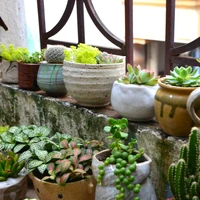
Beautiful, easy and mega!
With large, round leaves this plant makes a statement in your home - particularly if it has aerial roots. The holes give it an extra stylish boost and it comes as no surprise that this plant is a source of inspiration in the worlds of fashion and art. This sizeable fellow also works perfectly as a decorative room divider and living air conditioner for anyone who could do with some fresh air and privacy. If you don’t have green fingers, Monstera is your new best friend!
Colours and shapes
With its large, holey green leaves Monstera is unmistakable, but there are still different varieties. The classic green version is supplemented with a white variegated variety and a climber with smaller leaves that have large holes. The leaves of a young plant are heart-shaped. If given enough light and water, the leaves grow and deep incisions develop. Adult leaves can have a diameter of up to a metre.
Symbolism
It’s said that Monstera deliciosa represents suffocation because of the rapidly growing leaf-bearing vine and aerial roots. That’s why we prefer to stick to the Chinese symbolism, where the Monstera is a symbol of a long life and the honouring of elders and respected people. That’s a lot more cheerful and desirable!
Origin
The Monstera is a member of the Arum family and can be found in Panama and southern Mexico, where the plants climb up the trees to a height of some 20 metres. They also attach themselves to tree trunks, rocks or the soil with their fleshy aerial roots in the forests of Southeast Asia.
The best-known species is Monstera deliciosa. The name ‘deliciosa’ refers to the delicious 20 cm long fruit that used to be cultivated in Central America. The flavour is reminiscent of banana combined with pineapple, but at home you’ll be unlikely to come across a Monstera fruit basket sadly!
Care
- Monstera likes a light position, but not in full sun.
- Water moderately: the soil can be slightly damp, but not saturated.
- Some plant food once a fortnight is enough.
Article and image courtesy of The Joy of Plants - www.thejoyofplants.co.uk



